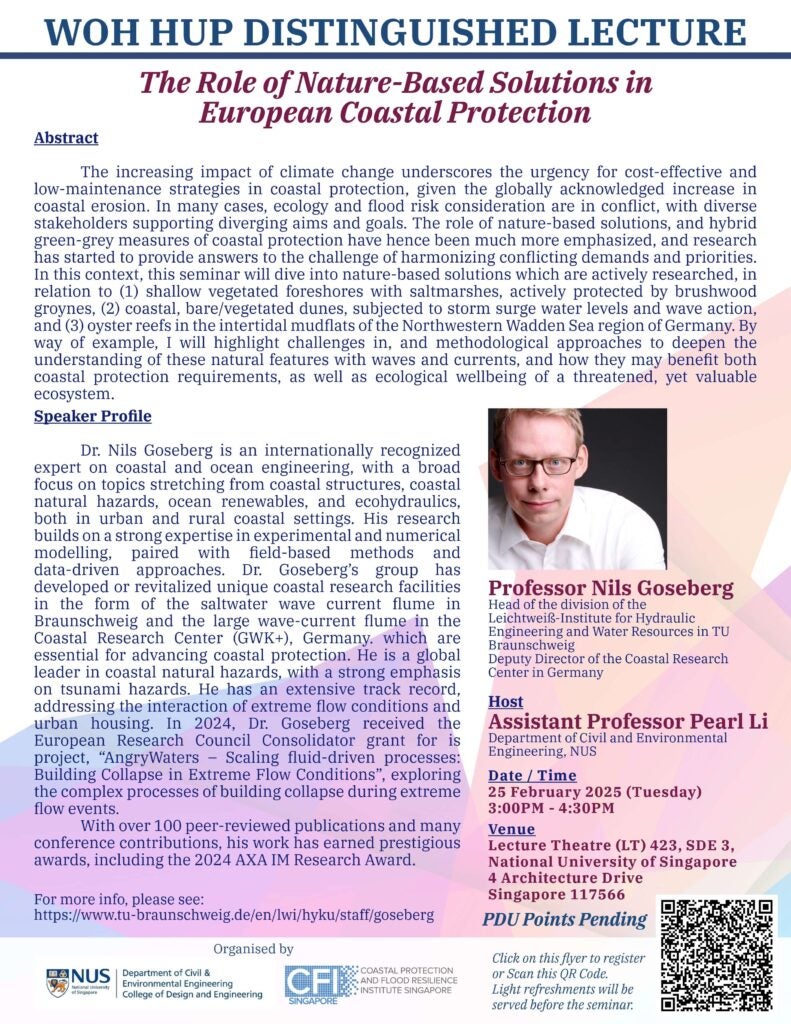Woh Hup Distinguished Lecture
Organized by the Department of Civil and Environmental Engineering (NUS) and CFI Singapore
25 February 2025
The Role of Nature-Based Solutions in European Coastal Protection
Speaker : Professor Nils Goseberg
Professor of Hydromechanics, coastal and ocean engineering, Technical Universität Braunschweig a, heading a division of the Leichtweiß-Institute for Hydraulic Engineering and Water Resources.
Deputy Director of the Coastal Research Center (Forschungszentrum Küste), a joint research facility with Leibniz University Hannover.
On 21 February 2025, the National University of Singapore (NUS), in collaboration with the Coastal Protection and Flood Resilience Institute Singapore (CFI Singapore), successfully hosted a highly insightful seminar as part of the Woh Hup Distinguished Lecture Series. The event, which was attended by over 70 participants.
As climate change accelerates, the seminar’s key message was clear: the increasing threat of coastal erosion requires sustainable, cost-effective, and low-maintenance coastal protection strategies. Traditional engineering solutions alone may not be enough to meet the challenges posed by rising sea levels and intensified storms. In this context, nature-based solutions and hybrid green-grey approaches are gaining more attention as viable alternatives for long-term resilience.
The session, led by an expert in the field, explored the research and practical applications of nature-based coastal protection measures in Europe. The seminar focused on three prominent examples:
- Shallow Vegetated Foreshores with Saltmarshes: Protected by brushwood groynes, these areas help mitigate coastal erosion while supporting biodiversity.
- Coastal Dunes (Bare/Vegetated): These dunes are subjected to storm surge water levels and wave action, presenting unique challenges for protection and management.
- Oyster Reefs: Found in the intertidal mudflats of the Northwestern Wadden Sea region of Germany, oyster reefs serve as both a protective measure against erosion and a means to restore ecological health to coastal ecosystems.
The speaker highlighted the challenges of harmonizing the needs of flood risk reduction with ecological preservation. The session emphasized how nature-based solutions can balance these seemingly conflicting priorities and provide a win-win solution for both coastal protection and environmental health.
Key takeaways from the seminar included insights into the methodological approaches used to study these natural systems, such as waves and currents modeling, and how they contribute to coastal resilience. The event also showcased the potential for international collaboration in advancing research and practical solutions in coastal protection, offering valuable perspectives for Singapore’s own coastal resilience efforts.
The seminar provided a valuable opportunity for attendees from academia, government, and industry to learn more about the evolving landscape of coastal protection and resilience in the face of climate change. We thank all the participants, speakers, and organizers for making this event a success. CFI Singapore and NUS remain committed to advancing knowledge and fostering collaborations that will shape the future of coastal protection and flood resilience.
CFI Singapore invites academia and industry partners to collaborate with us in organizing workshops and seminars focused on coastal protection and flood resilience. For collaboration inquiries, please reach out to us at cfisg@nus.edu.sg to discuss opportunities.


